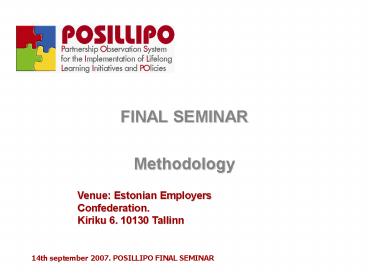FINAL SEMINAR
1 / 22
Title: FINAL SEMINAR
1
- FINAL SEMINAR
- Methodology
Venue Estonian Employers Confederation. Kiriku
6. 10130 Tallinn
2
Methodology Supporting key project objectives
- To explore and understand the partnership
dynamics of lifelong learning partnerships
profiles value systems - To explore and understand the relationship
between LLL partnerships and policy -
particularly how this relationship does and could
support innovation - To investigate the relationship between formal
and informal learning within LLL partnerships - Exploring and reviewing how LLL partnerships
operate at different levels European, national,
regional and local
3
The methodology is intended to.
- Build a model to define the characteristics of
partnerships and partnership dynamics (for
example organizational, cultural, values,
expectations) - Identify and analyse the forces that lead to LLL
partnership formation at the EU, national,
regional and local levels - Illustrate and understand partnership structures,
dynamics and driving forces - Develop a model to promote, develop and evaluate
partnerships - Provide inputs to designing validation procedures
and instruments - Provide inputs to designing a collaborative
learning platform and procedures to promote
collaborative learning within and between LLL
partnerships
4
Definition of partnership
- Sustained, inter-organisational arrangements that
are trying to achieve some more or less agreed
goals
5
Partnerships are expected to ....
- Reduce conflict increase coordination
- Deliver better services
- Control costs and improve quality
- Customise for the customer
- Achieve social and economic goals
6
Some different types of partnerships
- Joint ventures e.g. Healthy Schools
- Alliances e.g. Star Alliance Training Programme
- Coalitions e.g. SAS
- (Surfers Against Sewage)
- Concordats/compacts e.g. Riga concordat
- Networks e.g. European Distance Education
Network (EDEN) - Clusters Cambridge Science Park
- Supply chains e.g. Learn Direct
7
Partnerships are expected to provide
- A shared vision and shared objectives
- Interdependence and a clear division of labour
- Trust and sustained trust building
- Equitable distribution of costs, risks and
benefits - Equality or the empowerment of weak partners
- Mutual adjustment and learning over time
8
The optimists and the pessimists
- The pessimists Hobbesian, free-riding,
rent-seeking (Olsen) - The modified pessimists trust can be learned -
quid pro quo games theory, process based trust
(Axelrod, Zucker) - Optimists Altruism, value-based coordination,
mutual not self interest (Adler, Alter Hage)
9
Partnership as power dynamics
- We cannot ignore that power can be hidden behind
the facade of trust and the rhetoric of
collaboration and used to promote vested
interests through the manipulation of and
capitulation by weaker partners - (Clegg Hardy 1996)
10
The Environment
The Partnership
Partner B
Partner A
Leadership
n
11
Socio-technical systems
- Emery Trist (1960) - Tavistock
- Open Systems
- Origins in biology social darwinism
- Interdependency parts processes in
organisation inter-related change in one leads
to changes throughout - Organisations also inter-dependent with external
world political economy (Katz Kahn, 1966)
12
The hidden life or partnerships
- Individuals take psychodynamic tensions
infantile processes anxieties into organisation - Most evident in interactions with authority
figures - Shape responses to hierarchies and authority -
trust resistance compliance
13
Other theoretical models to understand
partnerships
- Sociological e.g. legal rules and how these
relate to norms and values - Ethnomethodological constructing a common
reality and obedience to group authority - Critical theory constructed through
communicative practices and power
14
Forces shaping LLL partnerships
15
MODEL TOOLBOX
- 6- step exercise
- 1.- polarities questionnaire
- 2.- Profile/ Pedagogy/Outcomes Table
- 3.- Assessment Questionnaire (indicators)
- 4.- Transformative Analysis (if needed)
- 5.- Improvement Plan
- 6.- Evaluation Assessment
16
MODEL
17
(No Transcript)
18
(No Transcript)
19
Profiling
20
Mapping partnership dynamics
21
Pedagogic mapping
22
Outputs mapping































